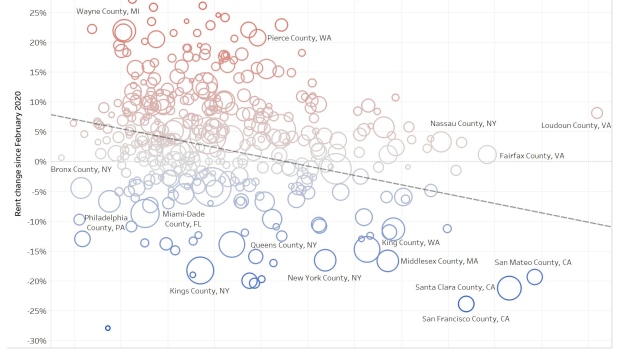(Bloomberg) -- They fled Seattle for Tacoma, San Francisco for Sacramento and New York City for Kingston.
As people relocated during the pandemic, median rents plunged in pricey, more-affluent U.S. counties and soared in cheaper ones where residents tend to earn less, according to a new report by Zumper, one of the country’s largest online apartment rental services. The broader implication is that affordability likely declined nationwide.
Take King County, Washington, which includes Seattle and its suburbs and has a median income of about $102,600 -- among the highest in the nation. Average rents for a one-bedroom apartment there sank 15% on average from February 2020 through the same month this year, data from Zumper show. Meanwhile, nearby Pierce County, home to Tacoma and with a median income of around $79,200, saw rents climb 21%.
“This is, at its heart, a migration story,” said Neil Gerstein, an analyst at Zumper and the author of the study. “These prices are shifting because the pandemic caused a lot of people to move.”
The data are yet another example of how inequality deepened last year. While people who fled expensive counties might have found the rents in their new locations more affordable than what they previously paid, the surge in demand has made things more expensive for people who lived in those communities before. Meanwhile, the bargains available in expensive counties have disproportionately gone to renters who can afford higher-end apartments, according to Gerstein.
Price declines in some expensive counties are already starting to moderate or even climb again after last year’s steep drops, Zumper’s figures show. But even as vaccines become more widespread, rents aren’t going to snap back immediately to what they were because some people will choose to stay in their new locations, according to Gerstein.
“Things will maybe get back to how they were pre-pandemic, but it will take a while,” he said. “At least for the near-term, people who live in these counties have to live with these price shifts.”
©2021 Bloomberg L.P.






